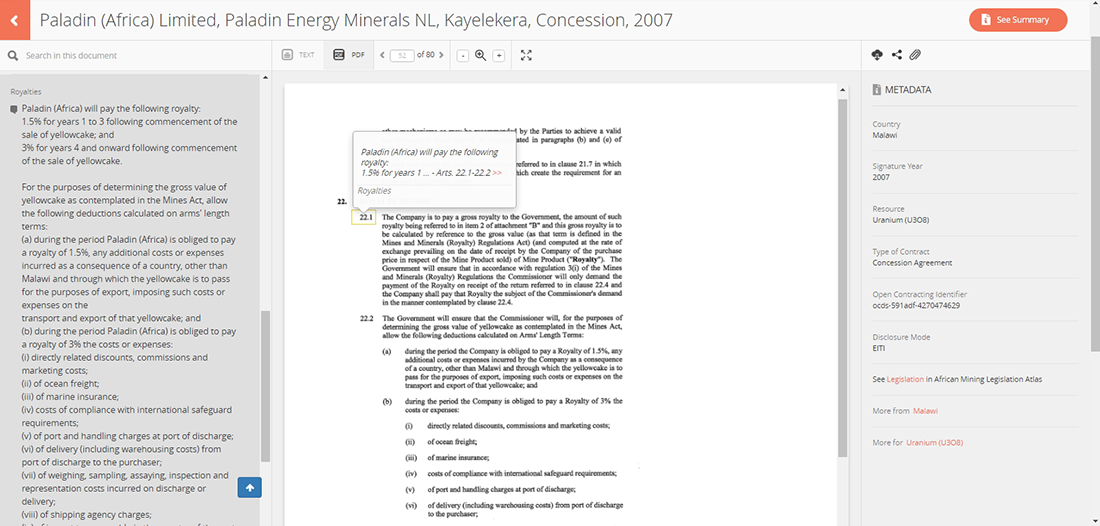
How can ResourceContracts Help Model a Mining Project? An Example from Malawi
What royalties should companies pay? What can governments hope to earn in the future? Do the companies really need tax reductions?
Access to contracts signed between extractive companies and governments can help answer questions like these. In many countries, however, extractive sector contracts remain closely guarded secrets and access to them has often been highly restricted, even within government. This limits the potential not only for effective citizen oversight, but also oversight from government bodies responsible for regulating parts of the industry.
Seeking answers, a group of both expert and aspiring financial modelers met in October 2016 in a rather sleepy German town to begin the work of using public domain information to dig deeper into oil and mining projects in their countries. Berlin-based OpenOil has been championing the process to improve transparency in the sector.
Contracts published
Malawians have been advocating long and hard for governments and companies to publish mining and petroleum contracts so that they might better understand the terms by which the country’s non-renewable resources are extracted.
When Malawi joined the Extractive Industries Transparency Initiative (EITI) in 2015, civil society in Malawi made sure that contract transparency was in the first work plan. Although officials at the Ministry of Natural Resources, Energy and Mining said that hard copies of the agreements were publicly accessible at the Department of Mines offices in 2015, it was still hard for most people to access them.
Six months later, the Malawi EITI Secretariat made two mining contracts available. These contracts were released on ResourceContracts.org. In doing so, Malawi became one of the majority of EITI implementing countries that publish contracts.
Building a financial model
Grain Malunga, a former minister responsible for mining in Malawi, and I used the 2007 mining development agreement for Kayelekera uranium mine, found on ResourceContracts, to build a financial model of Malawi’s largest mine, which contributed about 3 percent to the country’s 2013 GDP. The mine is operated by Paladin Energy.
ResourceContracts documents are annotated by legal experts, meaning we had access to contextualized information about key obligations, including fiscal provisions, which aided in building the financial model.
 Annotated Kayelekera contract on ResourceContracts.org Click to enlarge.
Annotated Kayelekera contract on ResourceContracts.org Click to enlarge.
We examined possible future scenarios for government revenue and for the mine, which is on care and maintenance (meaning that production has stopped, but the site is being managed to allow for potential recommencing of operations at a later date) due to depressed uranium prices and high operating costs.
As we modeled the fiscal regime, we learned that the break-even price—which the owner would need to obtain to cover the costs of extraction—was more than double the price of uranium at that time. The government has generated USD 12 million to date from royalties, but lost out on a further USD 15 million due to reduction in royalty rates. This was a result of mining development agreement negotiations that gave the Malawian government a 15 percent free carry equity stake in Paladin Africa, part of the Paladin Energy group of companies and the holder of the group’s interest in Kayelekera. We concluded that a further royalty reduction would only marginally increase the break-even price.
Much speculation surrounds when or if the mine will resume operations. The model has improved public awareness of what factors need to change, such as price, production to resume. As part of the Malawi EITI multi-stakeholder group, I hope to use similar skills and tools to produce financial models for projects in the exploration phase. In doing so, Malawian civil society hopes to ensure that our expectations—regarding revenues as well as impacts on local communities—are grounded in reality.
About ResourceContracts
The ResourceContracts platform is an online repository of oil, gas and mining contracts developed in partnership between the World Bank, NRGI and CCSI. The site enables civil society organizations, members of affected communities, government officials, researchers, and other stakeholders to search for contracts; view summaries of contracts’ key environmental, social, operational and fiscal provisions; and download full contracts as open data. The site was relaunched in 2015 with new features and contracts.
Rachel Etter-Phoya is an integrated expert on accountability, natural resource governance and public financial management at Citizens for Justice in Malawi.
